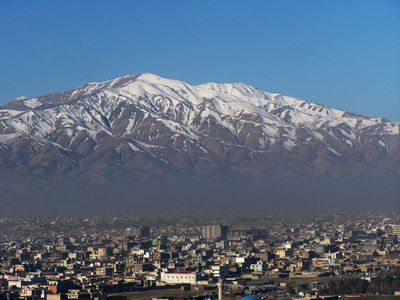Gynopedia needs your support! Please consider contributing content, translating a page, or making a donation today. With your support, we can sustain and expand the website. Gynopedia has no corporate sponsors or advertisers. Your support is crucial and deeply appreciated.
Kabul
OVERVIEW
Contraception (Birth Control)
General Note: There are many types of contraceptives, also known as "birth control," including IUDs, oral contraceptives, patches, shots, and condoms, etc. If you would like to view a full list, click here.
Laws & Social Stigmas
In Afghanistan, oral contraceptives (birth control pills) can be legally obtained without a prescription at pharmacies.[1][2]
According to a 2015 UN report, it was found that about 29% of Afghan women (who are of reproductive age and married/in unions) use some form of contraception, including traditional methods, and about 27% of women have unmet family planning needs. This rate is much lower than the average rate of contraceptive use in Southern Asia, where about 57% of women use contraceptives, or Western Asia, where about 58% of women use contraceptives. In Afghanistan, the most commonly used birth control method is contraceptive injectables, which are used by about 12% of Afghan women, and birth control pills, which are used by almost 7% of women. There are very low rates of usage for all other forms of contraceptives, including traditional methods (3.8%), condoms (1.6%), IUDs (1.5%), withdrawal (1.5%), contraceptive implants (1%) and female sterilization (0.7%).[3]
What to Get & Where to Get It
- According to one local contributor: "There is almost no access for local women to contraceptives other than condoms. It is possible to get a prescription for combined oral contraceptive pills, but the quality is not comparable to the assortment of pills in Western countries. There are NGOs in the country providing contraceptives of all kinds in Afghanistan, but not all local women have access to these NGOs."
Costs
Emergency Contraception (Morning After Pill)
Important Notes: Emergency contraception may prevent pregnancy for three days (72 hours) and sometimes five days (120 hours) after unprotected sex. Take EC as soon as possible after unprotected sex. If you don't have access to dedicated EC, oral contraceptives can be used as replacement EC, but remember the following: 1) Only some contraceptives work as EC 2) Different contraceptives require different dosages and time schedules to work as EC 3) You must only use the first 21 pills in 28-day packs and 4) They may be less effective than dedicated EC. For general information on emergency contraceptives, click here and here.
Laws & Social Stigmas
What to Get & Where to Get It
In Kabul are several international clinics and hospitals mainly treating expats and providing western contraceptives such as the morning after pill. There is no such service accessible for local women.
Costs
Sexually Transmitted Infections (STIs/STDs)
Important Notes - Learn about PEP and PrEP: If you think that you've been recently exposed to HIV (i.e. within 72 hours), seek out PEP (Post-Exposure Prophylaxis). It's a month-long treatment to prevent HIV infection after exposure, and it may be available in your city. Take PEP as soon as possible. For more information, click here. If you are at risk of HIV exposure, seek out PrEP (Pre-Exposure Prophylaxis). It's a daily oral pill that can prevent HIV infection before exposure. To learn more about PrEP, click here.
Laws & Social Stigmas
What to Get & Where to Get It
Testing Facilities
Support
Costs
Medications & Vaccines
Laws & Social Stigmas
What to Get & Where to Get It
Costs
Menstruation
Note: In addition to pads and tampons, you can also use menstrual cups and menstrual underwear for your period. To learn more about menstrual cups, click here. To learn more about menstrual underwear, click here.
Laws & Social Stigmas
What to Get & Where to Get It
Costs
Gynecological Exams
Laws & Social Stigmas
What to Get & Where to Get It
Most upper middle-class Afghan women tend to get a visa to either Pakistan or India to get their gynecological treatment, as they do not trust the Afghan medical facilities and doctors.
Costs
Pregnancy
Laws & Social Stigmas
What to Get & Where to Get It
Costs
Abortion
Important Note: There are two main types of abortions: medical (also known as the "abortion pill") and surgical (also known as "in-clinic"). For medical abortions, you take a pill to induce abortion. For surgical abortions, a procedure is performed to induce abortion. For general information about medical and surgical abortions, click here.
Laws & Social Stigmas
What to Get & Where to Get It
Costs
Advocacy & Counseling
Laws & Social Stigmas
What to Get & Where to Get It
Costs
List of Additional Resources
- Click here to learn about LGBT-related laws in Afghanistan. Be aware that homosexuality is illegal.
References
- ↑ Global Oral Contraception Availability
- ↑ Free the Pill: World Map
- ↑ [http://www.un.org/en/development/desa/population/publications/pdf/family/trendsContraceptiveUse2015Report.pdf Trends in Contraceptive Use Worldwide 2015]
